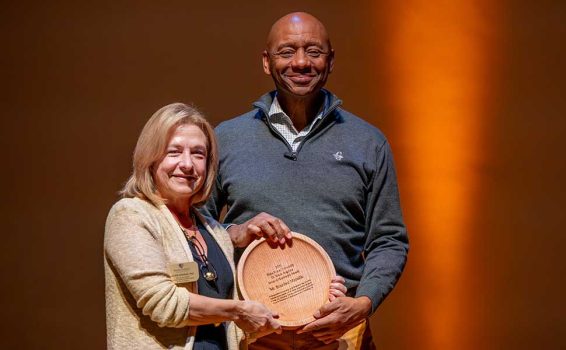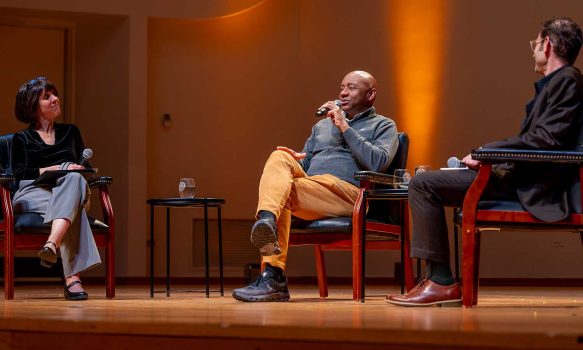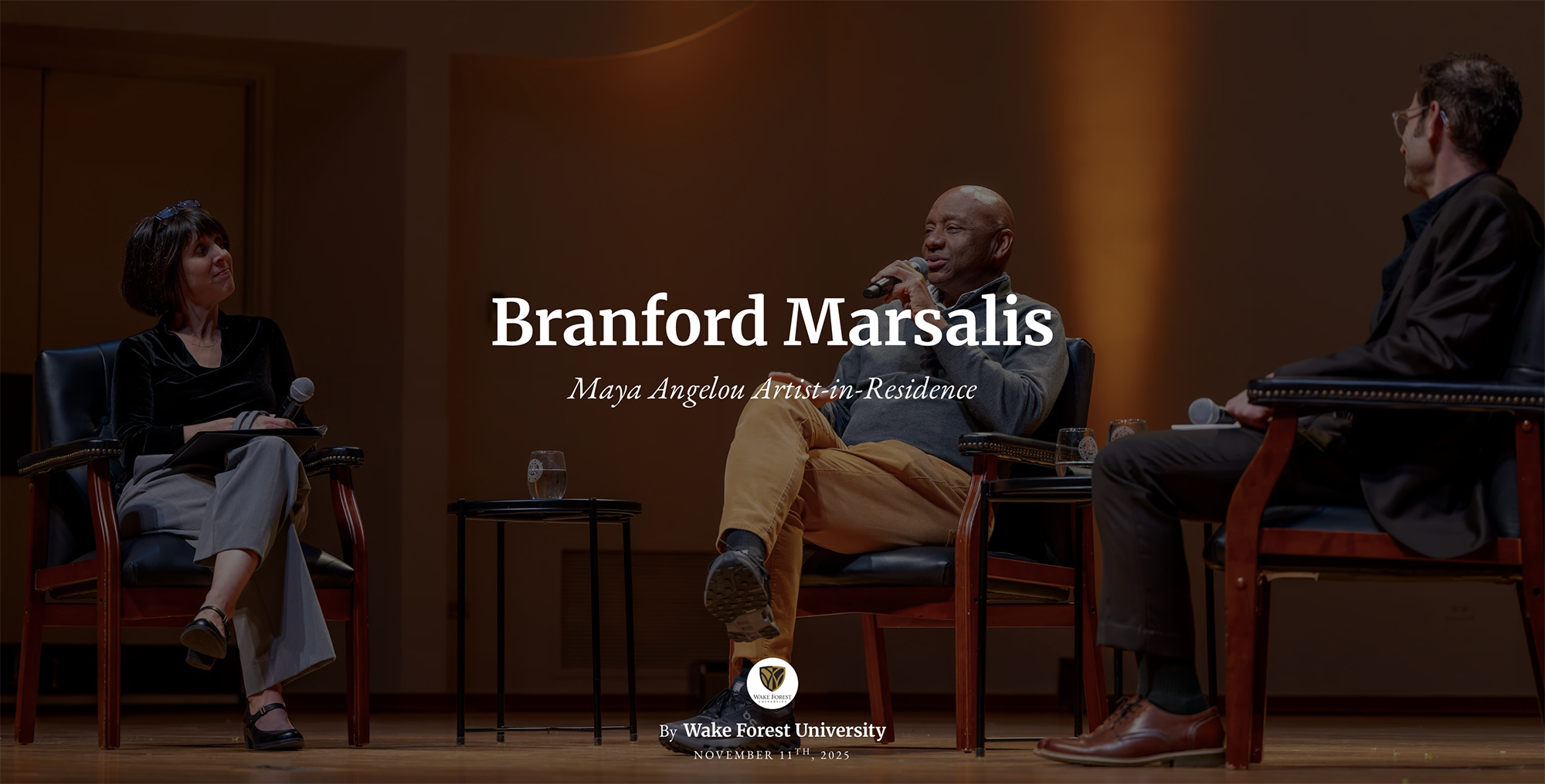2025 Maya Angelou Artist in Residence Branford Marsalis brings jazz wisdom to Wake Forest

In a career spanning over 45 years, Branford Marsalis has become an iconic figure in the music world as a saxophonist, composer, and bandleader, yet he maintains a sense of humor about his work.
“We’re always laughing before the concerts,” he said. “We take the music very seriously, but we don’t take ourselves seriously.”
Marsalis visited Wake Forest’s campus to receive the Maya Angelou Artist in Residence Award. He attended several classes with students, where he answered questions and discussed the creative process, the importance of playing for an audience, and knowing the difference between playing a piece accurately and playing it from the heart.
“One of my band directors in New Orleans when I was a kid – and I didn’t understand what he was saying – said, ‘well, son, that was correct, but it wasn’t right.’ I said, ‘well, what does that mean?’ and he said, ‘I can’t help you with that, you’ve got to figure it out.’”
Marsalis came to the Wake campus just days after his latest Grammy Award nomination, for Best Jazz Instrumental Album for “Belonging.”

He is perhaps best known to a wide audience as the longtime bandleader of The Tonight Show with Jay Leno and the leader of the Branford Marsalis Quartet. He was born in New Orleans, the son of a jazz singer and a music professor, and is the brother of Wynton Marsalis, another prominent figure in the modern jazz scene. He has worked with such prominent figures outside the jazz world as Spike Lee and Sting, with the New York Philharmonic, on Broadway in the 2010 revival of August Wilson’s “Fences,” and much more.
Marsalis is the second recipient of the Artist in Residence Award, which is presented biannually to artists who reflect Maya Angelou’s passions for creating, performing and teaching. He follows 2023’s recipient, Hollywood Walk of Fame Star Debbie Allen.
When he was approached about the award, Marsalis was flattered and fondly recalled collaborating with Angelou on a recording that incorporated her poem “I Know Why the Caged Bird Sings.”
The award was presented at the start of a moderated conversation at Brendle Recital Hall on Sunday, Nov. 10.
Run to your weakness
After the award presentation, Marsalis participated in a moderated conversation with Jacqui Carrasco, chair of the WFU music department, and Ali Sakkal, an associate teaching professor of education and longtime friend of Marsalis. The talk was wide-ranging and showcased Marsalis’s insightfulness, as well as his droll, self-deprecating sense of humor.
After the panel, Sakkal talked about the importance of connecting a pioneering figure like Marsalis with the students.
“When I was their age, as the undergrads that are here, there was something about meeting folks who are ‘in it,’ and also connecting to our elders in some way. They have not only the music, but they have the stories of their elders and others, and how a lot of those experiences are passed on….that human connection.”
During his residency, Marsalis participated in a Masterclass at the Scales Fine Arts Center, the first of two gatherings with students where he shared his insight and encouraged them to “run to your weaknesses — find the things you don’t do well and keep doing that.”
He pointed out that jazz legend Charlie Parker didn’t just wake up and sound like Charlie Parker, it took a lot of practice.

Marsalis complimented the students’ enthusiasm and critiqued their work after listening to several performances, and explained that beyond learning the technical aspects of playing, they needed to listen to musical pieces over and over again. “Just put it on and listen,” he said. “Don’t ask any questions, just listen, and then things will start coming to you.”
One of the students, Joe Devoy, said that it was intimidating at first to be in the presence of someone with such an impressive career. “I was shaking a little bit before we started, for sure, but it was a great experience,” he said. “It was great to get some honest feedback and hear the things we needed to hear.”
A student, Roman Boyer, asked the most questions during the Masterclass. “You’ve got to understand, I like to get the most out of the events I go to,” Boyer said afterward. “I also don’t have a problem with talking to great people who have been successful, or people who are currently huge, big names. We are all people, and he just happens to be an extraordinary one.”
Strike a balance
The next day, Marsalis participated in a combined class with students from David Geary’s “Music Theory for Popular and Jazz Styles” and Wan Heo’s “Introduction to Western Music.”
Bringing Marsalis into the combined class, Sakkal said, “Have fun, everybody,” and then gently chided Marsalis, “Be nice.”
Heo assigned her students to listen to one of Marsalis’s pieces and read his bio before the joint class. “Because we’ve been talking about different composers all the way from the Middle Ages up to the Romantic era, it was a really nice opportunity for the students to actually see someone who’s been performing live and is also a composer and a pioneer of a certain genre, and have a chance to ask him questions about whatever they are curious about.”
During the class, Marsalis talked about the process of developing music and shared pearls of wisdom from his father, such as “The thing you do most is the thing you do best.” He also discussed the importance of striking a balance between the songs you play for the audience and the ones you play for yourself, catering to diverse audiences, and getting out there to perform as much as possible. But perhaps the most important lesson, he said, is finding joy in what you do.
“This is hard to do when you like it,” he said. “If you don’t like it, you need to do something else.”
— Contributed by Tim Clodfelter
To view the Brandford Marsalis photostory, click below.



